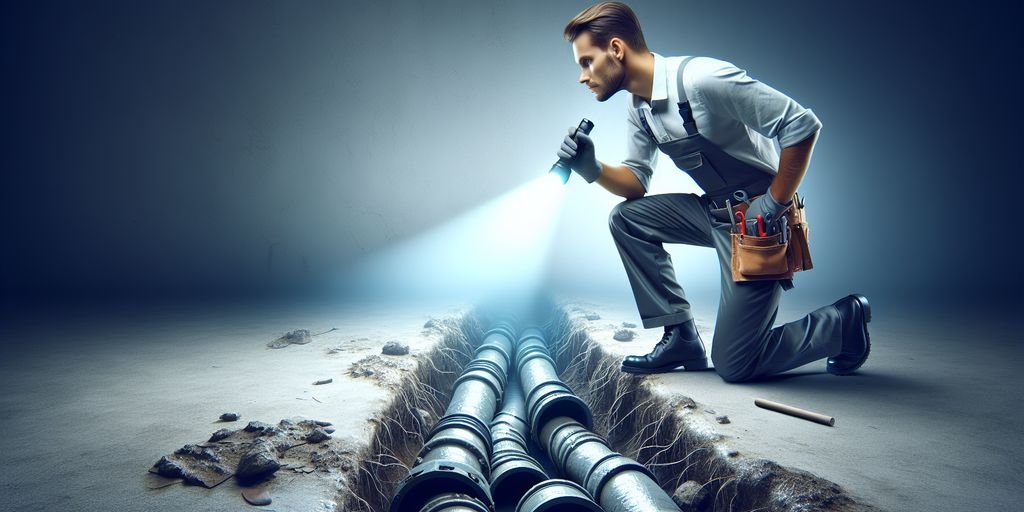Top Signs Your Sewer System Needs Immediate Attention
The sewer system in your home is vital for maintaining sanitation and health standards. Recognizing the signs that your sewer system needs immediate attention can save you from costly repairs and potential health hazards. This article outlines the top indicators that your sewer system may be failing and requires professional inspection or intervention.
Key Takeaways
- Slow drains can indicate clogs or blockages in your sewer line, requiring urgent professional attention.
- Low water levels in toilets can be a sign of sewer line issues and should not be ignored.
- A sudden drop in water pressure might suggest a breach or blockage in your sewer line.
- Unusual or foul odors emanating from drains are a clear sign of sewer line problems.
- Gurgling noises from your plumbing system can indicate trapped air due to sewer line issues.
1. Slow Drains
If you’re experiencing slow drains throughout your home, it’s a crucial sign that your sewer system may be compromised. Slow drainage can occur in sinks, toilets, and showers, often indicating a blockage or obstruction in your sewer line. Common causes include tree roots, debris, or misaligned pipes which prevent water from flowing freely.
It’s essential to address these issues promptly to avoid more severe damage to your plumbing system.
To effectively tackle slow drains, consider the following steps:
- Check individual fixtures for clogs that can be manually removed.
- Use a plunger or a chemical drain cleaner for minor blockages.
- For persistent or widespread issues, Locate and Remove Blockage with Drain Snake/Rooter to ensure a thorough cleaning.
- If problems persist, consult a professional plumber to inspect and diagnose your sewer system.
2. Low Water Levels
One top sign of sewage problems is if the water levels in the toilets of your home are low or change regularly. This can be particularly noticeable if there’s a different level each day or if your toilets bubble or make weird noises. Such fluctuations can signal bigger problems with your sewage line that only a thorough inspection will reveal.
Low or fluctuating water levels are a clear indicator that your sewage system may be compromised and requires immediate attention.
If you’re experiencing these symptoms, it’s crucial to consult with a plumbing professional to diagnose and resolve the issue effectively.
3. Low Water Pressure
A sudden drop in water pressure is one of the first indications that something is wrong with your plumbing system. Your faucets or showerheads may have a weak flow due to several problems, including a clogged pipe, a leak, or a broken pressure regulator. In addition to hurting your everyday activities, low water pressure might be a sign of a more serious plumbing problem that needs immediate professional care.
If the water pressure is low or it varies and fluctuates, it may be another sign your sewer line should be checked. Like slow drainage and low water levels, varied water pressure is often related to deeper problems. Call a professional if you consistently notice this issue.
4. Strange Odors
One of the most telling signs that your sewer system may be failing is the presence of strange odors. If you begin to notice an unpleasant smell, similar to sewage or rotten eggs, emanating from your drains, toilets, or sinks, it’s a clear indicator of a potential issue. These odors are not only offensive but can also pose serious health risks due to the presence of hazardous gases like methane, which is found in sewer gas.
It’s crucial to address these odors promptly as they can indicate a broken or clogged sewer pipe, or even a more severe issue with your sewer line.
If the smell is persistent and localized around your yard or home, it could be a sign of septic system issues, including problems with your drain field. Immediate inspection and repair by professionals are advisable to prevent further damage and health hazards.
5. Gurgling Noises
If you start hearing gurgling noises from your drains or toilet, it’s a clear indicator that your sewer system may be experiencing issues. These sounds typically arise when air is trapped in the plumbing system, often due to a blockage or a malfunctioning septic tank. The presence of these noises suggests that air bubbles are escaping through the liquid in your drains, which can point to a struggling septic system.
Gurgling sounds are not just annoying; they are a sign that your plumbing system is not functioning as it should. Immediate attention may be required to prevent more severe problems.
Here are some steps to address gurgling noises in your home:
- Check for visible blockages in sinks and toilets.
- Listen to identify the specific locations of the noises.
- Consult with a plumbing professional if the problem persists or if you notice other signs of sewer system failure, such as slow drains or unusual odors.
6. Wet Spots in Yard
If you notice wet spots or puddles on your property when it hasn’t rained, this could be a critical sign that your sewer system requires immediate attention. These wet spots are often accompanied by a foul odor and can indicate a broken or leaking sewer pipe underground. Such conditions not only damage the landscape but can also pose health risks due to the exposure to untreated sewage.
- Identify the location: Check for the most consistently damp areas or places where the grass seems unusually lush and green.
- Check for odors: A foul smell emanating from the wet spots is a strong indicator of sewage leakage.
- Observe the grass quality: Areas with leaking sewage might display unusually healthy-looking grass due to the unintended fertilization from the sewage.
It’s crucial to address these signs promptly by consulting with a professional to avoid more severe damage to your property and the environment.
7. Inconsistent Toilet Water Levels
If you notice that the water levels in your toilet are randomly rising or falling, this could be a clear indicator of issues within your sewer system. Such fluctuations are not only inconvenient but also suggest underlying problems that might require immediate attention. It’s particularly concerning if these changes occur without the toilet being used.
Fluctuating water levels in your toilet can signal more severe issues in your sewage line that only a thorough inspection can reveal.
To address this, consider the following steps:
- Monitor the water levels over a few days to confirm the inconsistency.
- Check for any signs of leaks around the toilet base.
- Listen for unusual noises that might indicate a problem.
- Contact a professional plumber if the issue persists or worsens.
8. Mainline Backup
Experiencing slow drainage in multiple drains is a telltale sign of a clog in your mainline. When your sewer line is blocked, water within your plumbing system cannot flow freely, causing water to back up into the lowest drain. Common causes of mainline blockages include tree roots, cracks in piping, and misaligned pipe connections.
It’s crucial to address these issues promptly to prevent more severe damage such as foundation cracks or extensive water backup.
Symptoms of Mainline Backup
- Multiple plumbing fixtures backing up simultaneously
- Frequent clogs in multiple drains
- Water pooling in unexpected areas
Diagnosing Mainline Issues
- Sewer camera inspection is the most effective method to diagnose and visualize blockages in real-time.
Preventing Future Backups
- Regular maintenance and inspections
- Immediate removal of tree roots intruding into sewer lines
- Repairing any identified cracks or misalignments promptly
9. Increased Water Usage
An unusual increase in water usage can be a clear indicator that your sewer system may be failing. This often manifests as higher utility bills, which can be alarming if there hasn’t been a noticeable change in your water consumption habits. If you’re experiencing a sudden spike in your water bills, it’s crucial to investigate the possibility of leaks or damage in your sewage system.
It’s essential to monitor your water bills closely and consult with a plumbing professional if you notice any inexplicable increases.
Here are some practical steps to address this issue:
- Regularly check for any visible signs of leaks or damage around your property.
- Monitor your water bills for any unexplained increases.
- Schedule regular inspections with a plumbing professional to ensure there are no hidden issues.
- Consider installing water usage monitors to help detect leaks early.
10. Noticeable Sewer Damage
When your property exhibits clear signs of sewer damage, it’s crucial to assess the situation for root causes immediately. Noticeable sewer damage can manifest in various forms, such as persistent foul odors, unusual wet spots in the yard, or visible signs of water damage around the property. These indicators are often accompanied by other symptoms like slow drains or gurgling noises, suggesting a compromised sewer line.
Immediate actions for basement sewer backups include assessing sinks and toilets, temporary measures like ventilation and disinfection, and contacting professionals for thorough inspection and resolution. Prioritize safety and preventive maintenance.
To effectively diagnose and address these issues, a video assessment of the sewer line is highly recommended. This method allows for a detailed inspection of the pipes to identify blockages, breaks, or other damages. Here are the steps typically involved in a professional sewer line assessment:
- Initial consultation to discuss symptoms and review the property’s plumbing history.
- Use of video inspection tools to examine the interior of the sewer line.
- Identification of blockages, breaks, or wear in the pipes.
- Discussion of findings and recommendation of appropriate repair or replacement solutions.
Conclusion
In conclusion, recognizing the signs that your sewer system requires immediate attention is crucial for maintaining the health and safety of your home environment. From slow drains to unusual odors and inconsistent water levels, these indicators should not be ignored. Addressing these issues promptly with the help of a professional can prevent more severe and costly damages in the future. Always be vigilant and proactive about your sewer system’s condition to ensure it continues to function efficiently and safely.
Frequently Asked Questions
What are the top signs that my sewer system needs immediate attention?
The top signs include slow drains, low water levels, low water pressure, strange odors, gurgling noises, wet spots in the yard, inconsistent toilet water levels, mainline backup, increased water usage, and noticeable sewer damage.
Why is it important to address sewer system issues promptly?
Addressing sewer system issues promptly can prevent major plumbing disasters, avoid costly repairs, and protect your health by preventing contamination from septic waste.
What should I do if I notice signs of sewer system problems?
If you notice signs of sewer system problems, it is crucial to contact a professional plumber immediately to address the issue and prevent further damage.
Can a faulty sewer line increase water usage?
Yes, a faulty sewer line can lead to an increase in water usage, often indicated by a noticeable increase on your water bills.
What are the consequences of ignoring sewer line issues?
Ignoring sewer line issues can lead to significant damage, costly repairs, and potential health and safety hazards.
How can I tell if my sewer line needs repair?
Signs that your sewer line needs repair include slow drains, strange odors, gurgling noises, and wet spots in the yard without an apparent cause.
What does a mainline backup indicate?
A mainline backup indicates a severe blockage in your sewer line, which can lead to major plumbing issues and requires immediate professional attention.
How can inconsistent toilet water levels be a sign of sewer problems?
Inconsistent toilet water levels can indicate a severe clog in your sewer line, suggesting an urgent need for sewer line cleaning or inspection.

